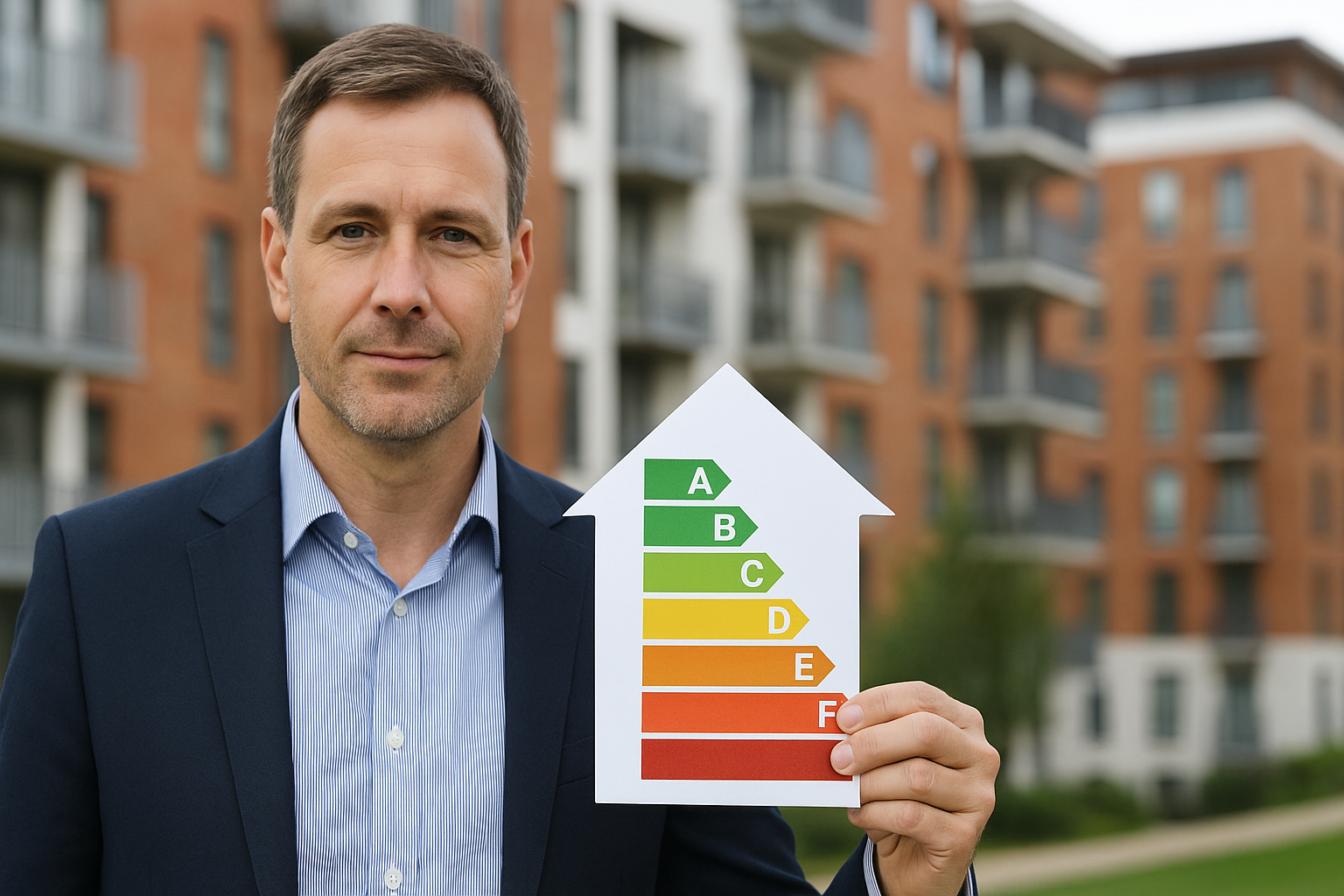Energy efficiency is vital to property performance, tenant comfort and long-term savings. While earlier proposals aimed to make EPC Band C mandatory by 2028 the government has since withdrawn that specific deadline. However, improving property energy ratings remains a major focus and landlords across England and Wales should still be planning ahead for the likely move towards EPC Band C by 2030.

What Are the Current EPC Rules for Landlords?
As of now (October 2025), the Domestic Minimum Energy Efficiency Standards (MEES) require all rented properties in England and Wales to have a minimum EPC rating of ‘E’. Landlords who let properties below this standard risk financial penalties. You can read the full government guidance on the Minimum Energy Efficiency Standards for landlords for more details.
It remains illegal to let a property with an EPC rating of F or G, unless a valid exemption is registered on the Private Rented Sector Exemptions Register. The current penalty for non-compliance can be up to £5,000 per property.
What Happened to the 2028 EPC ‘Band C’ Deadline?
Originally, the government proposed that all new tenancies must meet EPC Band C from 2025, and all existing tenancies by 2028. These proposals have now been scrapped following policy changes in September 2023.
Although the 2028 date is no longer law, the government continues to signal its commitment to improving energy efficiency. The long-term ambition is to see most rented homes reach EPC Band C or an equivalent new standard by 2030 — though final legislation is still pending.

Why It Still Matters Now
Even without an immediate legal deadline, landlords who act early will be in a stronger position. Improving your EPC rating now can:
Protect you from future regulatory changes
Enhance your property’s marketability and rental income.
Reduce running costs for tenants — increasing satisfaction and retention.
Futureproof your portfolio as lenders increasingly favour energy-efficient properties.
Ignoring EPC requirements could still lead to compliance issues, financial penalties, or reduced property values over time.
EPC Reform: What’s Changing from 2026
The EPC system itself is due for an overhaul around 2026, with a new method of assessment proposed. Instead of focusing mainly on running costs, the updated framework will measure:
Fabric performance – how well a building retains heat through insulation and glazing.
Heating system efficiency – prioritising low-carbon solutions like heat pumps.
Smart readiness – how easily a property can integrate smart energy systems.
This new system aims to provide a more accurate picture of energy performance, especially for homes using electric or renewable heating.
Common Improvements to Reach EPC Band C
Every property is unique, but there are several proven upgrades that can make a real difference to your EPC rating and overall energy efficiency:
Upgrade insulation in walls, lofts, and floors to reduce heat loss.
Install double or triple glazing to improve thermal performance.
Replace outdated boilers with modern, energy-efficient models.
Incorporate renewable technologies such as solar panels or heat pumps.
Seal drafts and optimise ventilation for balanced airflow and comfort.
These improvements not only enhance energy efficiency but can also increase property value and lower running costs. For more practical ideas and government-backed advice, visit the official UK guidance on improving home energy efficiency.
For landlords with multiple properties or complex portfolios, tailored lending strategies can help fund energy-efficient upgrades. Learn more on my Portfolio Landlord Mortgages page.
 Funding Options for EPC Upgrades
Funding Options for EPC Upgrades
Several funding routes may be available, including landlord finance solutions, green home improvement loans, or grants (where applicable). Future government incentives are likely to be linked to the move towards EPC Band C by 2030.
Mortgage lenders are also increasingly factoring EPC ratings into lending criteria. Some even offer ‘green mortgage’ products with reduced rates for energy-efficient properties.
 Turning Regulation into Opportunity
Turning Regulation into Opportunity
Rather than viewing EPC improvements as a burden, consider them an opportunity to strengthen your portfolio.
Boost property value: Energy-efficient homes typically command higher sale prices.
Reduce long-term costs: Improved insulation and systems lower maintenance and energy bills.
Stay ahead of legislation: Acting early prevents last-minute expenses when new rules arrive.
Landlords who plan proactively today will benefit tomorrow from higher yields, fewer voids, and an enhanced tenant experience.
Explore Related Buy-to-Let Strategies
Discover how your mortgage structure and lender choice can help finance EPC upgrades and strengthen your property investments.
Portfolio Landlord Mortgages
Find out how your mortgage structure and lender choice can help finance EPC upgrades and strengthen your property investments.
Explore Portfolio Strategies →Limited Company Buy-to-Let
Many landlords now use limited companies to manage buy-to-let investments more tax-efficiently. Discover how this setup can make it easier to raise finance for EPC improvements and long-term portfolio growth.
See Company Solutions →SPV Mortgages
A Special Purpose Vehicle (SPV) can simplify borrowing and open access to specialist lenders. Learn how SPV structures can help fund energy-efficiency improvements and futureproof your buy-to-let portfolio.
Learn About SPVs → Expert Advice Tailored to Your Portfolio
Expert Advice Tailored to Your Portfolio
Every landlord’s situation is different, and the right approach depends on your goals, budget, and property type. I provide clear, practical advice to help you improve your property’s EPC rating while maintaining profitability.
Whether you own a single rental property or a growing portfolio, I can help you plan energy-efficient upgrades and secure competitive finance options.
 What This Means for You
What This Means for You
The EPC landscape is changing — but with the right guidance, you can protect your investment, stay compliant, and increase your property’s long-term appeal.
If you’d like to discuss how the latest EPC developments might impact your portfolio or future purchases, I’m happy to provide tailored advice to help you plan ahead.

📞 Call me directly on 0808 503 4714 or 07508 147884
📩 Email: lyndsey@westwalesmoney.co.uk
#EPCRulesForLandlords #BuyToLetAdvice #GreenPropertyFinance #LandlordFunding #PropertyInvestmentUK


